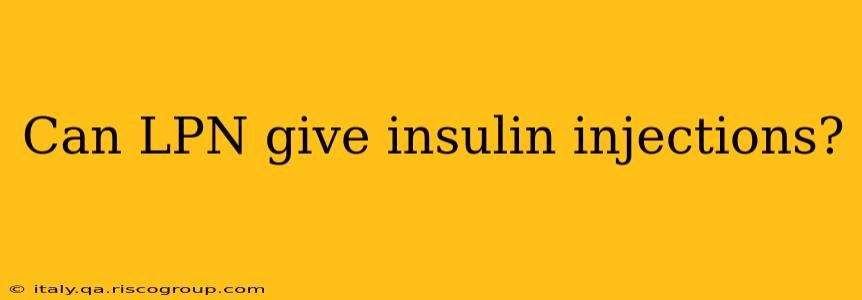Licensed Practical Nurses (LPNs), also known as Licensed Vocational Nurses (LVNs) depending on the state, play a vital role in healthcare. However, the question of whether they can administer insulin injections often arises. The answer, unfortunately, isn't a simple yes or no. It depends significantly on several factors, including:
State Laws and Regulations: The Primary Determinant
The most crucial factor governing whether an LPN can administer insulin injections is state law. Each state's Board of Nursing sets the scope of practice for LPNs. Some states explicitly permit LPNs to administer insulin under the supervision of a physician or other authorized healthcare provider. Others may restrict this practice to Registered Nurses (RNs) or limit it to specific settings, like long-term care facilities.
It is imperative to check your state's specific regulations. This information is usually available on the state board of nursing website. Failure to adhere to these regulations can result in disciplinary action against the LPN and potential legal ramifications.
Scope of Practice Defined by the Employer
Even in states where LPNs are legally permitted to administer insulin, the employer may have internal policies that further restrict this practice. Hospitals, nursing homes, and other healthcare facilities often have specific protocols and training requirements for medication administration. These policies are designed to ensure patient safety and maintain consistent standards of care. An LPN's ability to administer insulin will depend heavily on their employer's guidelines.
Level of Supervision and Training
The level of supervision required also varies. Some settings might mandate direct supervision by an RN or physician, while others may allow for indirect supervision. The specific training an LPN receives in insulin administration is also crucial. Comprehensive training, including proper injection techniques, recognizing hypoglycemic and hyperglycemic symptoms, and knowing how to handle adverse reactions, is essential for safe insulin administration.
Understanding the Different Types of Insulin and Administration Methods
Insulin comes in various forms, each with its own administration method. LPNs' competency in administering different types of insulin will depend on their training and experience. Understanding the differences between rapid-acting, short-acting, intermediate-acting, and long-acting insulin is vital for safe and effective administration. Furthermore, the administration route (subcutaneous injection) requires precise technique to avoid complications.
Beyond the Injection: Patient Education and Monitoring
The role of an LPN in insulin administration often extends beyond the injection itself. They may be responsible for:
- Patient education: Teaching patients about insulin management, including proper storage, dosage, and potential side effects.
- Monitoring blood glucose levels: Assisting with blood glucose monitoring and reporting results to the supervising physician or RN.
- Recognizing and responding to adverse events: Identifying and managing hypoglycemia (low blood sugar) or hyperglycemia (high blood sugar).
Conclusion: A Complex Issue Requiring Local Guidance
Whether an LPN can give insulin injections is a nuanced question dependent on state regulations, employer policies, and the LPN's training and level of supervision. Patients should always clarify with their healthcare provider and the facility about who is administering their medication and the specific protocols in place to ensure safe and effective care. Healthcare providers should familiarize themselves with their state's regulations and their employer's policies to ensure compliance and patient safety.

